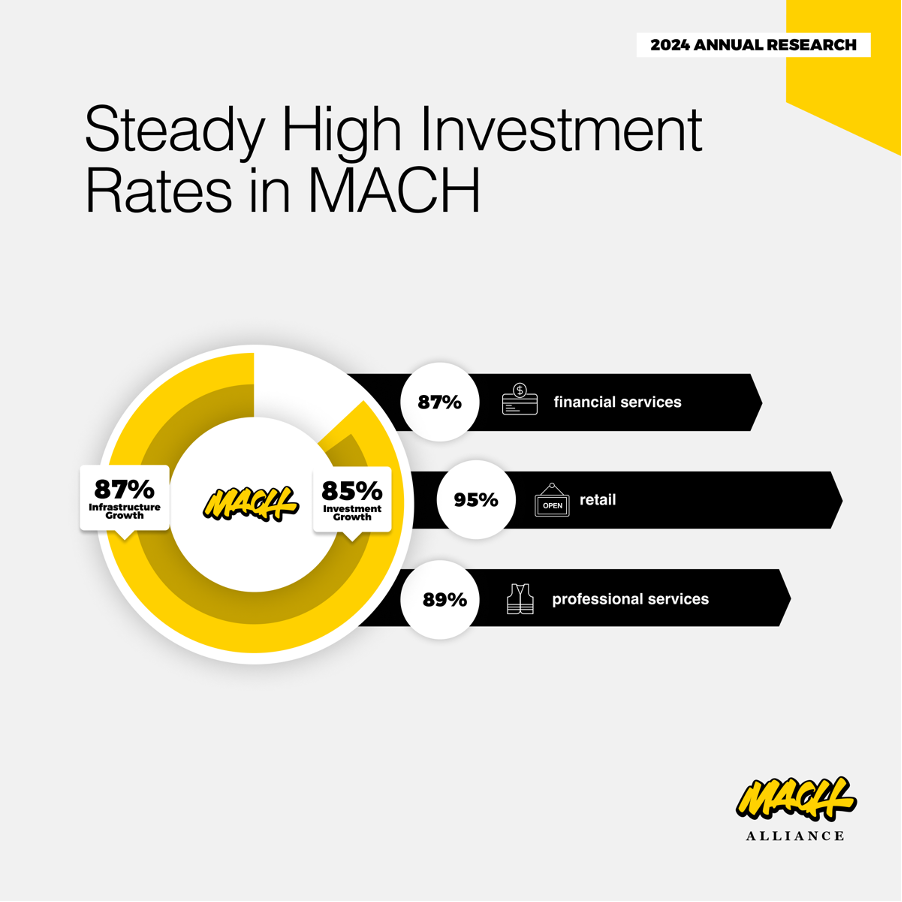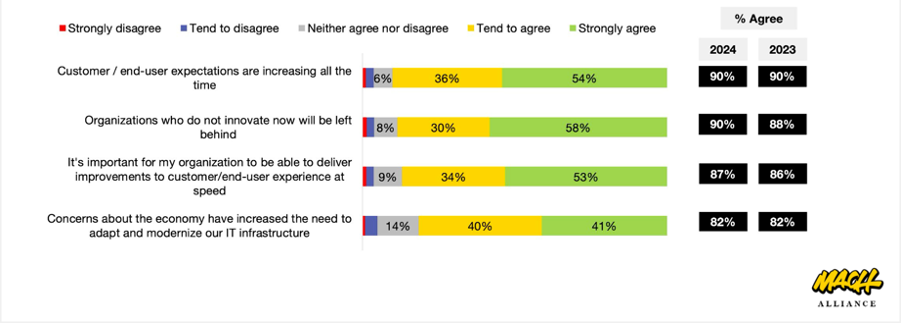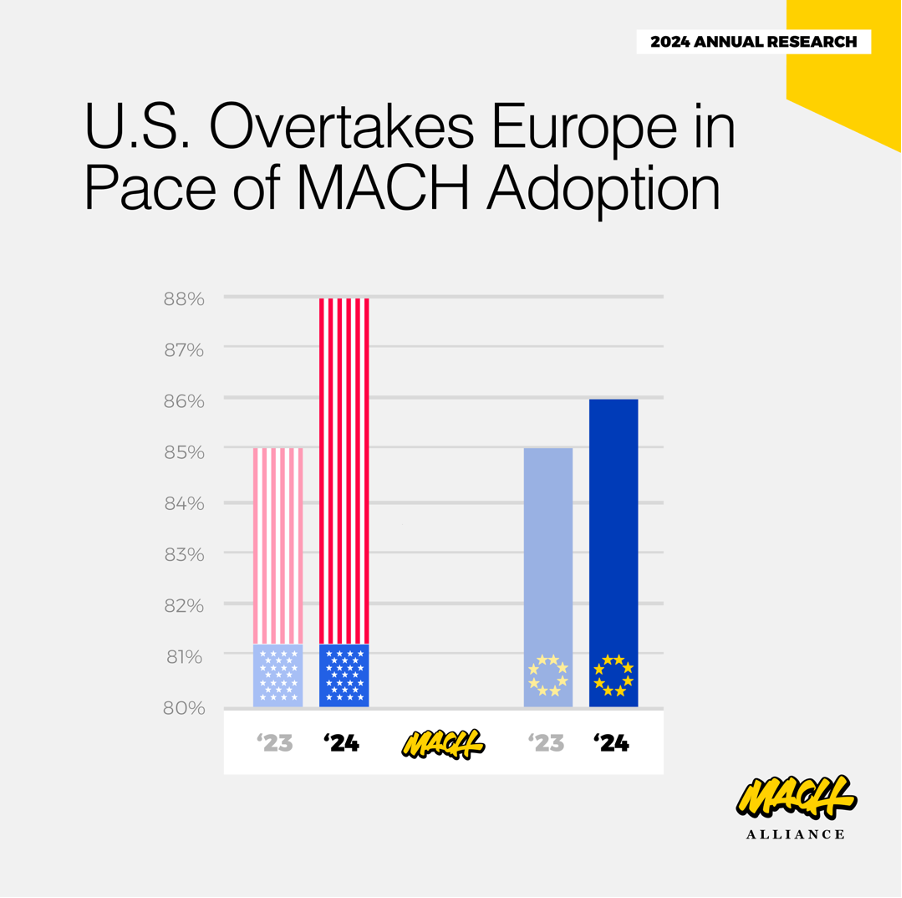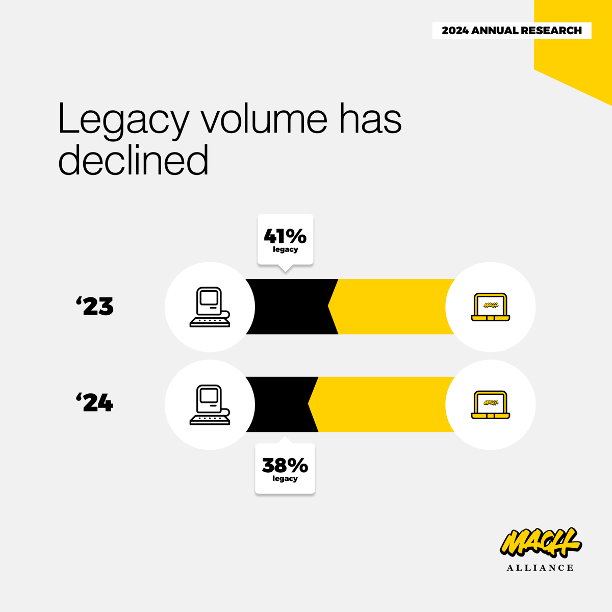Technological innovation under pressure in 2024
In 2024, companies face unprecedented pressure to innovate, particularly those burdened with outdated IT infrastructures composed of legacy technologies. The study reveals that 97% of decision-makers in companies with over 75% legacy systems believe that economic pressures are accelerating the need to modernize their IT infrastructure, compared to 82% of all decision-makers.

Reactive vs. proactive digital transformation
One of the critical missteps companies make in their digital transformation journey is a reactive rather than proactive approach. They often find themselves modernizing their tools and processes under the pressure of rapidly evolving customer demands.
Despite growing awareness, progress remains sluggish. The proportion of IT infrastructures relying on legacy technologies has only slightly decreased from 41% to 38% since 2023. In France, the figure remains higher at 43%, posing a risk to technological modernization, competitive positioning and customer responsiveness, which can lead to decreased revenue and reputational harm.
"Companies tend to be more reactive than proactive, often modernizing their tools under consumer pressure." - MACH Alliance Annual Survey of Global IT Decision Makers report
In this context, 75% of decision-makers believe that the urgency to innovate in 2024 is greater than in the past five years. This urgency is particularly acute among companies with predominantly legacy infrastructures, with 94% of decision-makers in this group recognizing the necessity of short-term innovation.

Embodying values to drive innovation
Despite the pressure to innovate, companies struggle to embody the values necessary to stimulate their innovation efforts. They perceive themselves as less daring, agile and proactive than before. However, companies that do embrace these values, especially through adopting composable technologies, are better positioned to meet customer demands and achieve growth even in challenging times.
The rise of composable commerce
Composable commerce, a modular approach to building commerce platforms, enables businesses to integrate the best available technologies rather than relying on monolithic solutions. According to MACH Alliance research, 91% of IT decision-makers believe MACH technologies will be critical to their success over the next five years, with 85% reporting clear ROI from these technologies once adopted.
"91% of IT decision-makers say MACH technologies will be critical to their success in the next five years." - MACH Alliance Annual Survey of Global IT Decision Makers report
Faced with the need to innovate, many companies are turning to MACH technologies as essential for sustaining and growing their business in an unstable economic environment. Currently, about half of the surveyed companies' IT infrastructures incorporate MACH technologies.
Sector-specific investments and benefits
Business services and retail sectors lead in investing and implementing MACH software, dedicating significant portions of their IT budgets to these solutions. Companies that measure the ROI from their MACH transition report tangible benefits, including:
-
Greater flexibility and agility in operations
-
Improved customer experiences and organizational agility
-
Easier integration with various technological solutions through APIs
Challenges of legacy systems and transition to MACH
Adoption of MACH technologies is on the rise, particularly in the US compared to Europe. However, challenges remain. The transition to composable commerce is often hindered by internal resistance and the complexity of overhauling existing systems. Companies with more than 75% legacy solutions spend significantly more time on software upgrades (68%) compared to those with less than 25% legacy systems (26%). Despite the evident time and budget savings MACH solutions offer, many companies are reluctant to abandon their legacy systems, with only 38% having started a complete transition.

In France, the shift towards MACH is primarily driven by headless technologies. Companies with high technical debt that have adopted MACH tools, especially headless solutions, have streamlined their processes, relieved their teams, developed new functions more quickly and simplified digital platform management.
Educating teams and senior managers on the impact of these technologies and partnering with the right vendors are crucial for successful transitions.
The outlook for MACH technologies
The retail sector continues to lead in MACH adoption, but other sectors like financial services and manufacturing recognize its benefits. New markets and industries, such as automotive, are also beginning to explore MACH applications, indicating a bright future for composable commerce.
Despite the innovation pressure, sustainable development has become a lower priority. Only 86% of decision-makers now consider sustainability very or moderately important in their technology stack decisions, down from 91% in 2023. This shift is likely due to the immediate economic pressures overshadowing long-term sustainability goals. Nonetheless, the adoption of MACH technologies signals a profound transformation in business practices, offering greater agility, innovation and customer satisfaction.

Embracing the era of composable commerce
Composable commerce is no longer a future vision but a current reality, redefining global commerce standards. The steady growth of MACH and the continual integration of new members into the MACH Alliance underscore the necessity for businesses to understand and embrace these technologies actively. By doing so, they transition to a more flexible and resilient model, essential for maintaining competitiveness in today's market.
As sectors beyond retail begin to recognize the benefits and adopt these technologies, the future of composable commerce looks promising. To stay competitive, companies must embrace this evolution and leverage MACH technologies to build a more adaptable and resilient IT infrastructure.



